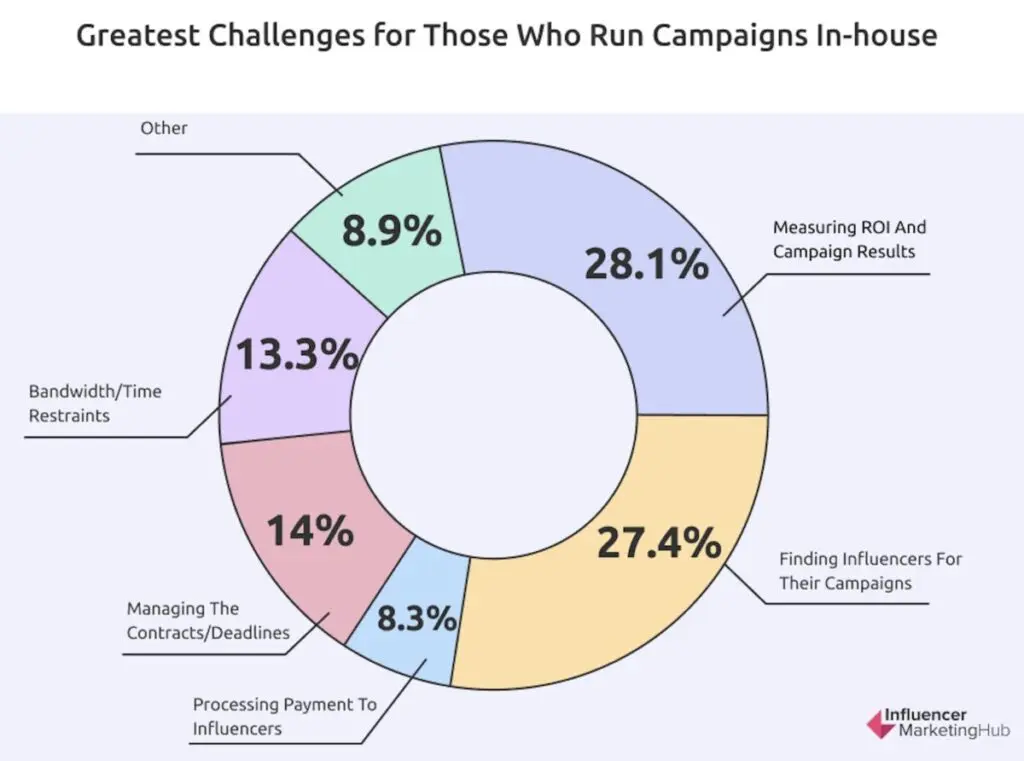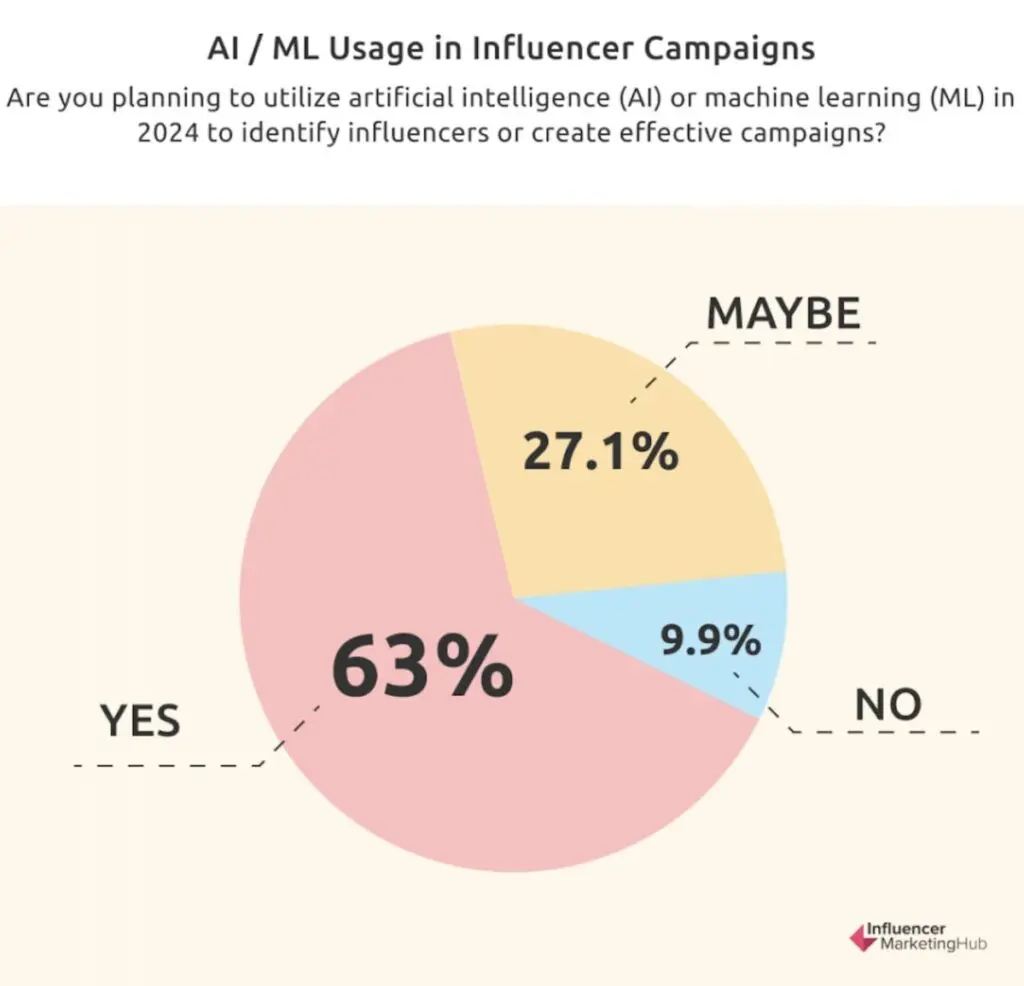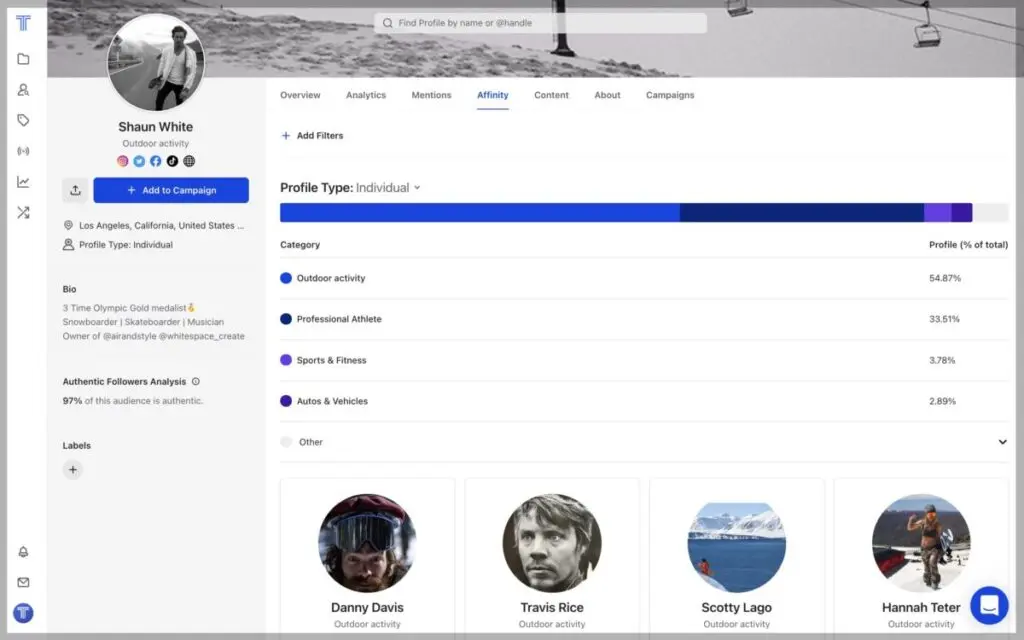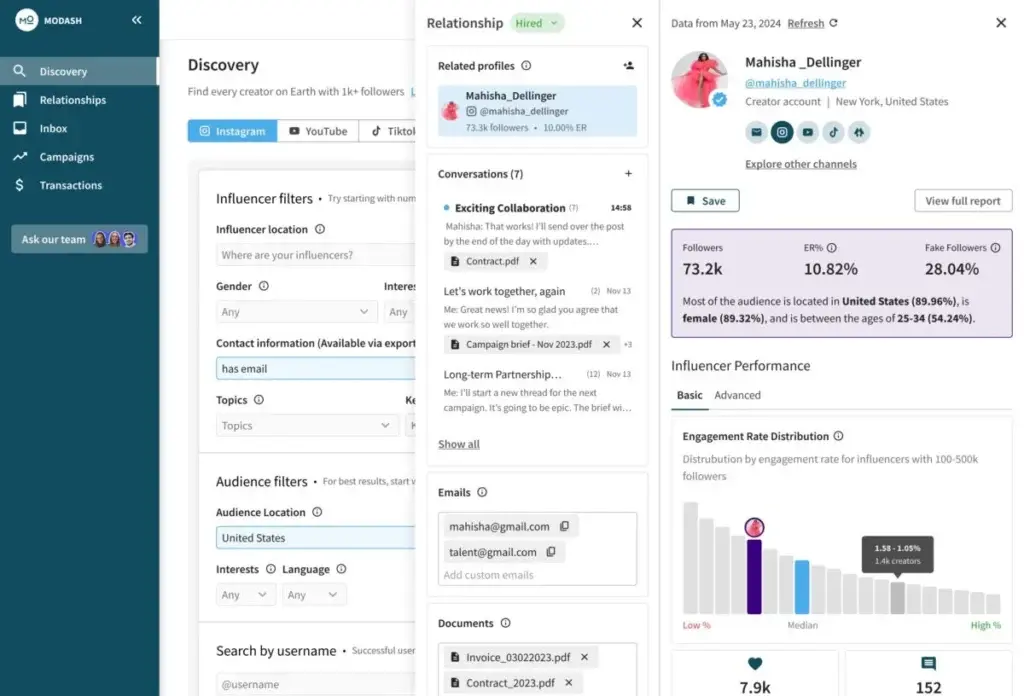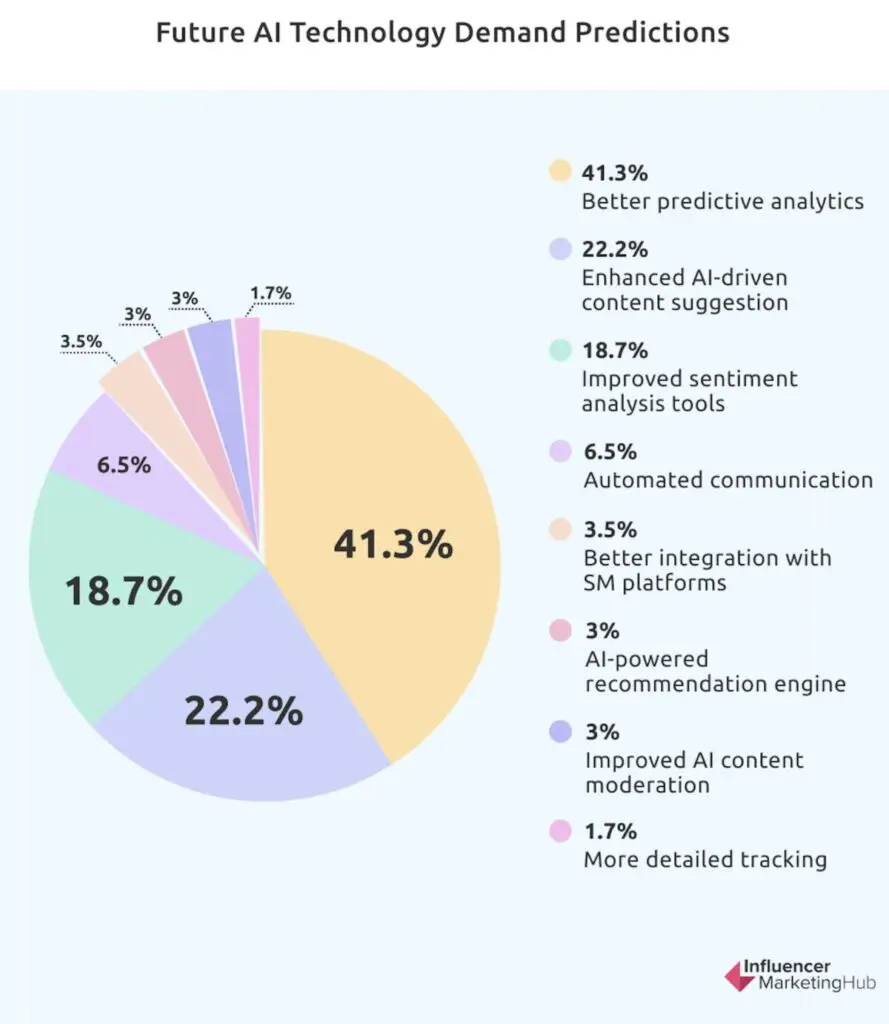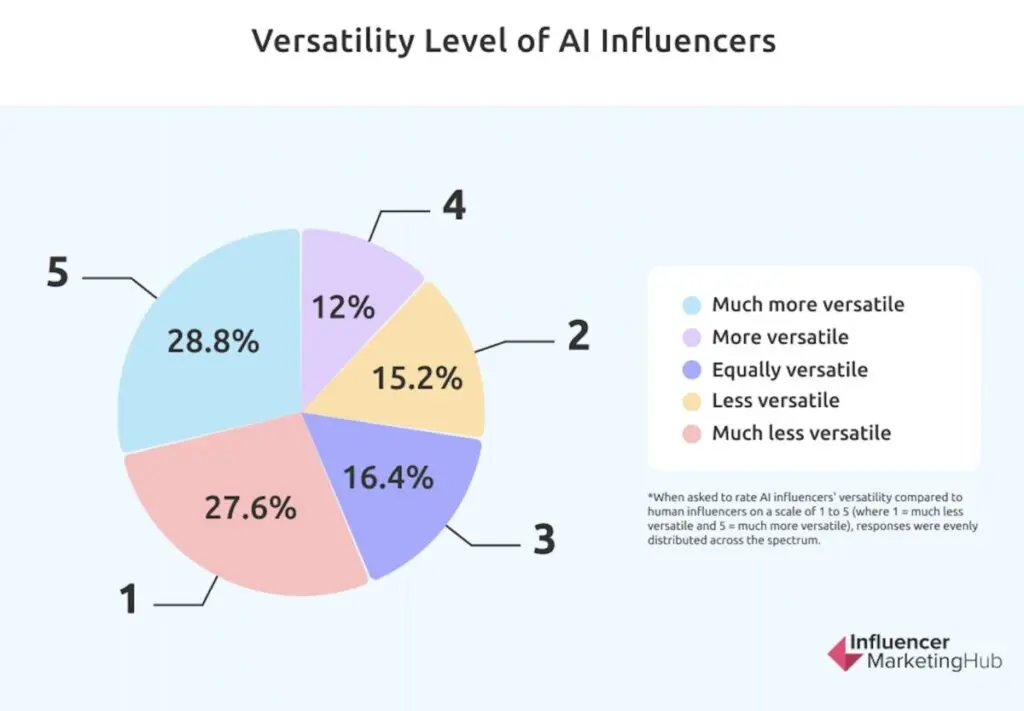From AI-powered influencer discovery tools to AI influencers—the influencer marketing industry has seen its fair share of AI-led transformation. However, marketers are faced with the unique challenge of balancing the transformative potential of AI with concerns over authenticity. In fact, our July 2024 Influencer Marketing Report found that 36.7% of marketers are concerned that AI-powered influencers present a lack of authenticity.
Additionally, 19% fear potential consumer mistrust from using AI influencers. These are valid concerns, especially with authenticity being the second biggest quality that consumers look for in an influencer.
In this guide, we take an in-depth look at how the influencer marketing landscape is seeing an AI-led transformation. We also explore how marketers can strike the perfect balance by leveraging AI to address authenticity concerns.
- The AI Evolution in Influencer Marketing
- AI-Powered Influencer Identification: Beyond Follower Counts
- Personalization at Scale: AI-Driven Campaign Automation
- Precision Audience Segmentation with AI
- Fraud Detection: AI as a Safeguard
- Predictive Performance Analytics with AI Tools
- Emerging Trends: Virtual Influencers and AI Influencers
- Embracing the Revolutionary Power of AI Influencer Marketing
- Frequently Asked Questions
The AI Evolution in Influencer Marketing
AI’s ability to speed up manual processes is streamlining multiple aspects of influencer marketing. This is helping to solve some of the biggest challenges that marketers face in running campaigns with influencers.
Traditionally, marketers faced a major challenge in identifying influencers for their campaigns. Between concerns over influencer fraud and needing to consider brand alignment, influencer identification proved to be the biggest challenge for marketers running their campaigns in-house. According to our State of Influencer Marketing Benchmark Report 2024, 29.8% ranked it as their top concern.
However, with AI tools having the power to pull and analyze millions of data points, they can simplify the process by automatically matching brands to the right influencers. Moreover, AI can analyze audience quality, allowing marketers to easily identify fraudulent influencers. These capabilities are helping to speed up and optimize the influencer identification process.
Time constraints are another major challenge that marketers face in their influencer marketing campaigns. In a previous survey, 14% reported challenges with managing contracts and deadlines, while 13.3% experienced issues with bandwidth and time restraints. This challenge largely arises from managing time-consuming and manual campaign workflows.
Marketers traditionally had to analyze influencer data manually and rely on basic category filters for their campaign targeting. The lack of influencer audience analysis tools further created inefficiencies in the segmentation process. These challenges not only resulted in time constraints but also led to inconsistent ROIs.
Influencer outreach, onboarding, and payments were also mostly done manually. Similarly, engagement tracking was a slow and manual process, which involved pulling data from different influencer content to understand performance and fine-tune their campaigns.
AI is changing all of this with the ability to quickly analyze millions of data points and provide actionable insights. This makes it easier for marketers to analyze audiences for segmentation, listen in on social media conversations, measure sentiment, and provide predictive insights for campaign success.
Moreover, AI is enabling them to automate several aspects of their influencer campaign management, minimizing the need for manual work. In fact, nearly 75% of respondents in our 2024 State of Influencer Marketing survey believe that influencer marketing can be automated.
With all these factors considered, it’s no wonder 63% of marketers plan to use AI in their influencer campaigns. Even now, almost 60% of respondents in our State of AI in Influencer Marketing Report are reporting an improvement in influencer marketing outcomes as a result of AI technologies.
AI-Powered Influencer Identification: Beyond Follower Counts
Traditional influencer identification processes mostly relied on two main factors: category and follower count. Marketers looked for influencers in their chosen category who had a significant following. While this worked fairly well at the time, the industry soon outgrew the process with a growing demand for brand alignment.
Brands could no longer simply focus on follower count alone to identify an ideal influencer. Instead, they needed to work with creators whose values and voices aligned with theirs to ensure that their partnership resonated with their target audiences.
Enter AI with the power to analyze millions of influencer content and data points at scale. Intelligent matching algorithms allow brands to instantly get matched with influencers who are closely aligned with their values. These tools consider a variety of factors such as audience demographics, engagement rates, and influencer content, to find the most appropriate creators for each brand.
Their natural language processing capabilities allow them to scan for certain topics and keywords and identify themes that align with your brand. They can then come up with potential matches based on compatibility.
Solutions like LTK Match.AI from LTK can even make suggestions based on historical and real-time product performance data. It analyzes how influencers have performed with specific products, similar items, or certain categories. It then provides personalized recommendations for creators who are most successful on the platform.
Modash also has a feature for AI influencer discovery. It lets you search visually, based on what you can see in the content, instead of relying solely on what is written in captions and hashtags.
Beyond this, marketers can also use AI-driven selection criteria to further narrow down their influencer search. This enables them to really refine the discovery process by looking at key details such as credibility, interests, past collaborations, and brand affinities.
For example, the Sprout Social influencer marketing platform helps you look for lookalike profiles based on affinity. So if you find an ideal influencer who creates content about outdoor activities, the platform’s algorithm looks for similar profiles talking about the same topic. You can further drill down on the affinity results using filters like audience size and profile category.
These reflect the drastic leaps that have been made in the use of AI technology for influencer identification. It streamlines and speeds up the process while enabling better brand alignment to make for a successful partnership. Naturally, influencer identification was the main purpose of using AI for over 55% of respondents in our 2024 State of Influencer Marketing report.
Personalization at Scale: AI-Driven Campaign Automation
Although influencer marketing has matured over the years, managing campaigns still involves a lot of manual work. Setting aside the influencer discovery process, marketers still have to put in some grunt work for various aspects of the campaign, especially if they want to personalize things.
For instance, they have to manually reach out to potential influencers for a personalized touch to their communications. Similarly, they have to manually manage their relationships with influencers. This includes everything from onboarding and follow-up to contract management and negotiations as well as reviews and feedback.
Various AI solutions can be leveraged to address these challenges, allowing you to automate and personalize your campaigns at scale. For instance, you can use AI to send personalized outreach messages, track your responses, and automatically follow up as needed.
Similarly, you can build automation workflows to streamline the content creation and approval processes for your influencer campaigns. Use AI to automatically send personalized creative briefs, queue up content for review, and get suggestions on content improvement. Additionally, you can even automate content approvals and payments and save time managing your campaign.
AI-powered platforms like Skeepers let you run your campaigns on auto-pilot, with the ability to automatically match your brand to the right influencers. You can further automate influencer outreach and content generation as well as rights management. Get the necessary permission to repurpose creator content to easily scale your marketing and communications.
Beyond this, AI can be used to get actionable insights to inform your content strategies. You can use AI to analyze trends and sentiment around social media conversations relevant to your industry. Then get suggestions on topics, hashtags, and trends to incorporate into your influencer content strategies.
Platforms like Grin let you automate your campaign management by tracking your influencer-generated content and automatically finding your top-performing posts. This can inform your content strategy and even help you pinpoint which ones to repurpose across your marketing mix. Additionally, it automatically tracks and calculates your influencer payments to simplify this aspect of campaign management.
Precision Audience Segmentation with AI
Traditional influencer marketing campaigns mostly relied on audience segmentation at the category level. This meant that marketers were identifying influencers based on their main content category, which was too generic to allow for precise audience targeting.
For instance, if the campaign was related to the fitness industry, their only option was to find fitness influencers. If they wanted to drill down on more specific sub-interests and segments, such as deadlifts or marathon runners, they had to manually sift through the influencers’ content.
AI changes all of this through advanced demographic insights and targeted influencer selection to power precise audience segmentation. With the ability to easily scour millions of user profiles and influencer content, AI can break down what sub-topics the influencer focuses on. This helps you reach more precise audience segments, ensuring better relevance and greater resonance.
For instance, instead of simply finding influencers who specialize in home decor content, you can look into what décor niche they’re into. Are they into minimalist home décor? Or perhaps small space living? These allow you to really get precise with your influencer campaigns, helping you reach highly specific segments of audiences.
Platforms like Modash come with these advanced influencer analytics features. It gives you a breakdown of the various interests of an influencer’s followers, allowing you to zero in on influencers who can reach specific audience segments. Plus, the platform even analyzes the influencer’s most used hashtags and mentions.
This makes it easier to quickly check how relevant the influencer’s content is to your offering. With this level of precision, you can build influencer campaigns that truly reach and resonate with the exact type of people you want to target.
Fraud Detection: AI as a Safeguard
Influencer fraud is one of the biggest concerns for marketers in the industry today. With services that offer fake followers and engagements, influencers can easily pump up their numbers to attract potential brand partners. This poses a major risk to brands as their influencer marketing investments may not pay off as well as they’d anticipated.
Brands are more susceptible to fraud when their influencer search process focuses on numbers alone. Follower counts and engagement rates are easy to fake, making it crucial for marketers to dig deeper into the authenticity of an influencer. This requires a lot of manual work, such as searching through the comments and individual accounts of an influencer’s followers. So this slows down the process of finding the right influencers for a brand.
In fact, concerns over influencer fraud are only increasing. Our 2024 State of Influencer Marketing report noted over 71% of respondents were worried about the practice. This is a jump from the 2023 numbers, where 64% of respondents had concerns about influencer fraud. Moreover, the number of respondents who experienced influencer fraud increased from 31% in 2022 to almost 60% in 2024.
This is where AI comes in, enabling marketers to quickly analyze the authenticity of an influencer’s following. So we can anticipate a simpler, more accurate fraud detection process. According to our State of Influencer Marketing report, the third most popular use of AI in influencer marketing is for identifying bogus influencers and engagements.
There are multiple AI-powered influencer marketing platforms enriched with this capability. For instance, Modash gives you an upfront look at the percentage of fake followers for each influencer.
It goes even more in-depth with a breakdown of followers who are real people vs. influencers vs. mass followers vs. suspicious mass followers vs. bots and fakes. This helps you really drill down on all the possible ways that influencers might pump up their numbers.
Predictive Performance Analytics with AI Tools
When it comes to influencer marketing, results tend to vary greatly by your choice of influencers. Even those who seem to perfectly fit the bill may not always generate the kind of results you expect.
So in most cases, you never know if an influencer will have the desired impact unless you run a campaign with them. This can be time-consuming and wasteful, slowing down the process of generating returns on your influencer marketing investment.
AI’s predictive analytics capabilities address this key concern by allowing marketers to forecast campaign outcomes and visualize influencer performance. These systems make use of past patterns and trends, combining them with various aspects of an influencer’s profile to predict how they’ll perform. Marketers can then use these predictive insights to make strategic decisions on how to optimize their content and campaigns.
For example, Linqia’s Resonate platform comes equipped with AI-powered predictive technology to recommend influencers who are likely to add the most value to your campaign. This helps you make informed decisions based on the forecasted suggestions.
Its real-time analytics comes with influencer-specific performance data, audience sentiment analysis, and machine learning-derived content insights. These allow you to understand how people are responding to your campaign, so you can pivot and optimize even after it goes live.
The use of AI-backed predictive technologies in influencer marketing is gaining traction. According to our AI in Influencer Marketing Report, 22.3% of respondents are currently using this AI technology. This makes it the fourth most used AI technology in influencer marketing.
At the same time, the technology is still at a nascent stage and requires further improvement to attain mainstream adoption. With 41% of respondents requesting better predictive analytics to forecast campaign performance, this is the most requested improvement.
Emerging Trends: Virtual Influencers and AI Influencers
The continued advancements in AI technology have also brought on an interesting new trend in the influencer marketing industry: AI influencers, also known as virtual influencers. These are virtual personas created using a combination of AI and computer-generated imagery (CGI).
The influencer marketing industry, once dominated by human personalities, is now experiencing a transformative shift with the rise of AI-generated influencers.
Whilst 88% of people say authenticity is a key trait they want to see, digital personas, created and powered by… pic.twitter.com/XIKENP1D2Q
— Kieran Gilmurray (@KieranGilmurray) August 23, 2024
The creator enters a text prompt into an AI-generation tool, such as Midjourney or Stable Diffusion. The tool then uses this text input to generate an image of the virtual character. Creators will customize the character’s persona to fit a specific target audience, which will then be used to build and maintain their social media presence.
If you’re interested in the whole process, check out our How to Create an AI Influencer and Make Money guide.
Human Influencers vs. Virtual Influencers: Leveraging Their Strengths in Campaigns
In spite of the overwhelming demand for authenticity among consumers, there’s a significant shift toward virtual influencers among marketers. Almost 60% of marketers in our State of AI in Influencer Marketing report have already planned campaigns with AI influencers. Out of these, 77% have a positive view of the effectiveness of AI influencers.
So what’s the deal? Why are some marketers choosing to work with AI influencers instead of human influencers?
Customizability is one of the biggest factors, as brands have the freedom to create a virtual persona that’s tailored to match their exact specifications. This isn’t always possible with human influencers. Although this is what adds to the human element, some brands may prefer the flexibility to create an “ideal” influencer if they have very specific needs.
According to our State of AI in Influencer Marketing report, over 56% of marketers believe that AI influencers are more versatile than human influencers. With brands being to create tailored personas to align with specific brand narratives and target audiences, virtual influencers offer a hyper-personalized approach to influencer marketing.
On a related note, since these virtual personas are completely fabricated, AI influencers are less likely to be involved in controversies. They pose a lower risk to your reputation since their actions and content are completely managed.
Cost is another key consideration that’s fueling the shift toward virtual influencers. According to our report on influencer rates, there’s been an increase in brands spending less than $10,000 on their influencer campaigns. However, a significant portion of their spending still goes toward influencer fees.
With AI influencers, on the other hand, AI-generation platform fees make up most of the campaign costs. This allows marketers to keep their costs low since they’re not spending money on influencer fees.
That said, virtual influencers aren’t without risks. Ethicality is one of the biggest considerations with working with these AI-generated influencers. Almost 50% of marketers in our survey were highly concerned about the ethical considerations of working with these influencers. Being transparent about the AI-generated nature of an influencer is the key to overcoming this.
Moreover, the perceived authenticity of the virtual influencer is also another key consideration, with almost 40% of marketers being concerned about this. This is a valid concern since AI influencers are, at the end of the day, artificial. This means that they lack a certain authenticity that human influencers possess.
With their personal stories and unique experiences, human influencers bring a level of authenticity and relatability that can’t be replicated by AI influencers. At the same time, human influencers don’t offer the level of scalability and flexibility that brands love about virtual influencers. In other words, both types of influencers offer unique benefits that give them leverage over the other.
So when it comes to choosing between human influencers and their AI-generated counterparts, it’s not about picking sides. Instead, it’s about understanding their unique superpowers so that you can leverage them for maximum impact. There’s a need to pivot and take a hybrid approach that strategically uses both types of influencers for their unique strengths.
Lil Miquela is one of the most well-known AI influencers, having amassed over 2.5 million followers on Instagram. The influencer’s massive reach has been used to spread awareness about important topics like electronic waste in partnership with clothing designers like Leeann Huang and Lisa Says Gah.
Embracing the Revolutionary Power of AI Influencer Marketing
Considering the hold that AI already has on influencer marketing and the ongoing growth potential, there’s a promising future in store where AI empowers brands to run more impactful, more targeted campaigns. When strategically combined with the creativity and authenticity of human influencers, AI can take influencer marketing to the next level.
Frequently Asked Questions
What is AI-driven influencer marketing?
AI-driven influencer marketing is the use of AI technology to power various aspects of an influencer marketing campaign. This may involve using AI to seamlessly match brands to the right influencers, perform automated outreach, forecast future results, and more.
How do AI tools improve campaign ROI in influencer marketing?
AI tools like predictive analytics can be used to forecast the ROI of influencer marketing campaigns. Additionally, AI can make strategic recommendations on how to create content that resonates. These insights can be used to make informed decisions about how to create more impactful campaigns.
What are the ethical challenges of using AI-generated influencers?
Misleading audiences (whether intentionally or unintentionally) is the biggest ethical challenge of using AI-generated influencers. This is why there’s a need to be transparent about whether an influencer is real or created using AI.
Are virtual influencers more cost-effective than human ones?
Aside from platform fees, virtual influencers typically don’t have additional fees. This could make them most cost-effective compared to their human counterparts.
How can AI help small businesses in influencer marketing?
AI allows small businesses to develop a hyper-personalized influencer campaigns with personas that are tailored to their specific requirements. They can do so at a much lower cost compared to the cost of working with human influencers.
What legal challenges arise with AI-generated content?
AI-generated content may come with legal risks in the form of plagiarism. Marketers need to strategically combine the efficiency of generative AI with human-led creative decision-making to overcome these risks.
What is the future of hybrid influencer models?
Hybrid influencer models are expected to play a central role in the future of influencer marketing. With both AI and human influencers offering unique benefits, brands are looking to pivot and strategically make use of the unique strengths of both types of influencers.
What role does machine learning play in improving influencer selection?
Machine learning can be used to analyze influencer profiles and content and combine them with audience engagement data. This helps brands to streamline the influencer selection process and easily zero in one influencers who match their selection criteria.
How can brands balance authenticity with efficiency using AI?
Brands can leverage AI to efficiently automate some of the manual processes of influencer selection and campaign management while balancing it with real, human connections for increased authenticity.

